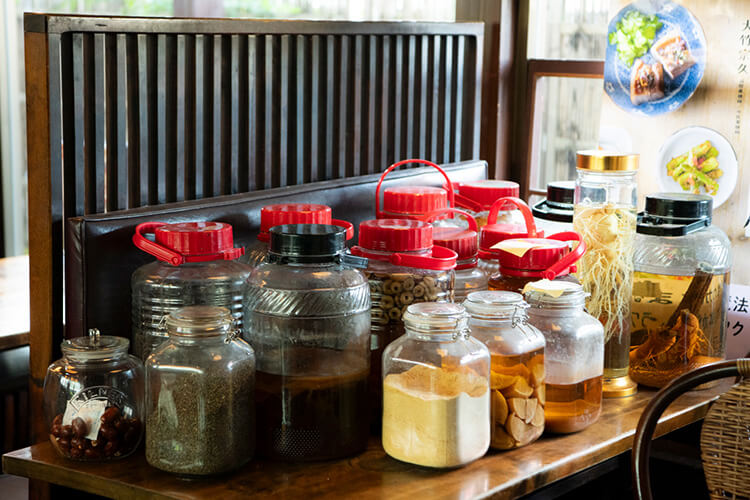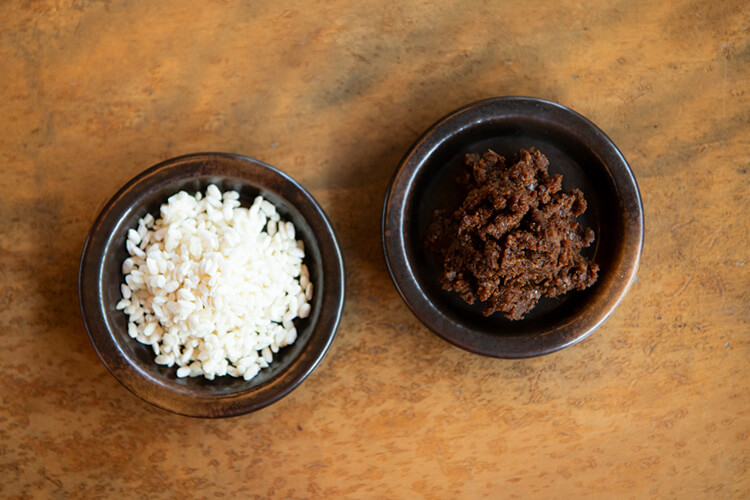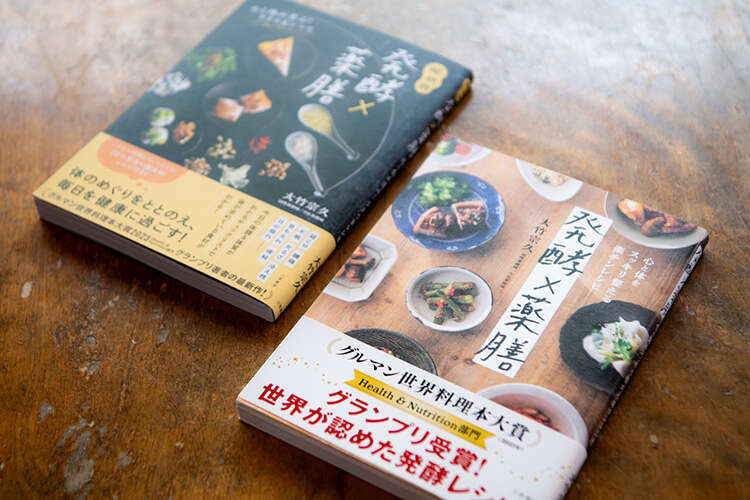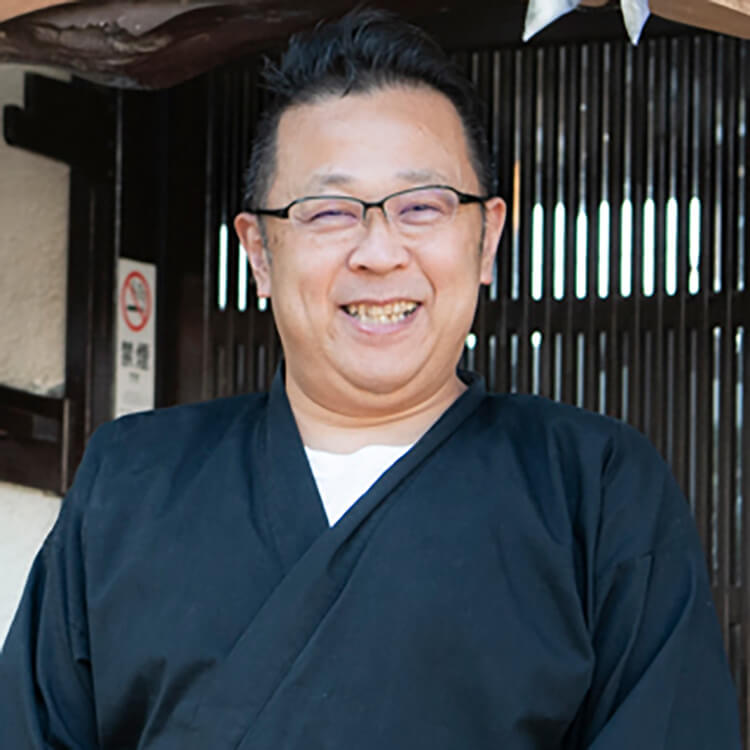Fermented Medicinal Food: Insights from a Yakuzen Chef
Feb 28,2025
Fermented Medicinal Food: Insights from a Yakuzen Chef
Feb 28,2025


Otake Munehisa is an expert in making fermented medicinal cuisine. He’s a certified international medicinal cuisine chef and traditional Chinese medicine chef. And he’s made quite a splash with his 2023 book Fermentation Meets Chinese Medicinal Cuisine: Super Simple Recipes for Conditioning Mind and Body (in Japanese): it won the grand prize in the Health & Nutrition category of the Gourmand World Cookbook Awards, which honor the world’s best cookbooks. We asked Munehisa about the magic of the fermented medicinal cuisine he champions.
While running a soba noodle restaurant in Hiratsuka, Kanagawa Prefecture, Otake Munehisa works to spread awareness of the benefits of combining fermented foods with Chinese medicinal cuisine. He gives talks on Chinese medicinal cuisine, medicinal tea, and fermented foods. He first became interested in fermentation and medicinal cuisine because of his children’s food allergies.

Otake Munehisa, second-generation proprietor of the soba restaurant Nagoya
“They had terrible food allergies. They were allergic to soybeans, wheat, eggs, chicken, milk, you name it. We couldn’t use soy sauce or miso because soybeans and wheat were off limits. There were so few things they could eat that their entire diet consisted of vegetables with salt. Since I’m a bit of a chef myself, I figured there must be something I could do. So I started looking into different foods.”
Then one day an acquaintance mentioned that you didn’t need to use soybeans to make miso. So Munehisa tried making miso with chickpeas instead of soybeans, and soy sauce with chickpeas and brown rice instead of soybeans and wheat, and both turned out wonderfully. Eventually, as he read more about food allergies, he came to realize the importance of rebalancing the gut environment.

Potato miso, which is made with boiled potatoes instead of soybeans
“I thought I could improve my kids’ physical wellbeing by rebalancing their gut environment, so I put them on a diet incorporating fermented foods. I got them drinking the sweet fermented rice beverage amazake and replaced salt with salted koji (rice malt). Well, their condition soon improved, and their symptoms almost completely disappeared. That made me realize what a huge difference the food you eat makes.”

Three forms of amazake served at Munehisa’s restaurant: black koji amazake, black rice amazake, and mikan (Japanese mandarin) amazake, a limited seasonal offering
Having developed an interest in foods and their benefits, Munehisa enrolled in a school of Chinese medicinal cuisine and became a certified international medicinal chef. Later, he took a class in fermented cuisine on the island of Tanegashima south of Kyushu, where he came to better appreciate the flavor of koji rice malt. Then he hit on the idea of combining fermented foods with Chinese medicinal cuisine.
Chinese medicinal cuisine, which is rooted in traditional Chinese medicine — one of the world’s three great systems of traditional medicine — is designed to restore mental and physical balance. Though widely perceived as esoteric, it’s surprisingly easy to incorporate into your diet, says Munehisa.
“The basic idea behind Chinese medicinal cuisine is that food works like medicine. You are what you eat. It’s simply a matter of tweaking your everyday meals. Have a sore throat? Eat lotus root. Feeling constipated? Stew some gobo (burdock root). I’d also recommend drinking Chinese medicinal tea, which is easy to incorporate into your routine and works especially well. My nails split easily and I’m concerned about graying hair, so instead of water I drink black Chinese tea made with black soybeans or black sesame seeds.”

Chinese medicinal tea is effective against whatever ails you. Ginger tea is good for cold sensitivity and stiff shoulders. Black goji tea is good for tired eyes. Jujube tea relieves fatigue.
Eating seasonal ingredients is one of the basics of Chinese medicinal cuisine. Simply choosing different-colored ingredients depending on the season will allow you to eat more healthily by incorporating medicinal cuisine into your diet.
“In spring, choose green foods like wild greens and komatsuna (Japanese mustard spinach). During the rainy season, choose yellow foods like kabocha squash and maize. In summer, choose red foods like tomato and watermelon. In the fall, choose white foods like daikon radish and white rice. In winter, choose black foods like seaweed and black sesame. It’s not as hard as you think. Just remember the right colors.”

House-made soy sauce and kelp tea and Chinese medicinal ingredients in a corner of the restaurant
The fermented medicinal cuisine championed by Munehisa combines fermented seasonings with the principles behind Chinese medicinal cuisine: opting for seasonal foods and choosing ingredients to match your physical state. Eating fermented foods every day may be a challenge, but just replacing your regular seasonings with fermented ones is easy.
“The idea is to replace the salt and sugar you usually use with salted koji and sweet koji when preparing your everyday meals. Fermented seasonings are easy to make yourself, though it’s fine to use store-bought if you like. If you suffer from severe menstrual cramps, for instance, stir-fry some spinach, which helps produce blood, and flavor it with soy sauce koji. Soy sauce koji with its pronounced umami makes a nice defining note. It’s also a time saver, since you don’t need to add any other seasoning. Dishes like these are good for you from a medicinal cuisine point of view, and they keep your gut healthy thanks to the fermented seasonings used. My family loves this food. They say it keeps them regular and improves the appearance of their skin.”

Soy sauce brewed in house last year. The soybeans are a nice snack to enjoy with a drink.
Another item easy to incorporate into your daily diet is dressing made with salted koji. Simply combine salted koji with lemon and pepper, and that’s it. No oil is required, since koji rice malt already has a thick, viscous consistency.
“At home, I often make carrot dressing by putting carrots and onions in the blender with salted koji, lemon, and pepper. I use different vegetables depending on the season: typically carrots in the winter to produce blood and celery in the summer, which has a cooling effect on the body.”

House-made rice koji, and miso made with pesticide-free soybeans from Kanazawa.
Having won the grand prize in the 2023 Gourmand World Cookbook Awards with Fermentation Meets Chinese Medicinal Cuisine: Super Simple Recipes for Conditioning Mind and Body, Munehisa has just published his second book. It’s called Fermentation Meets Chinese Medicinal Cuisine: Simple, Delicious Recipes for a Happier Mind and Body, Classified by Symptom. Now he’s working on his third book.
Munehisa is making every effort to spread the word about fermented medicinal cuisine. He gives classes on Chinese medicinal cuisine and fermented foods not only in Japan but also overseas. Despite his busy schedule, however, he has an endless list of things he wants to do.
“One day I’d like to open a small restaurant that serves Chinese medicinal cuisine and medicinal tea. I’d also like to teach kids about nutrition. I already give lessons in making miso and soy sauce at my restaurant, but I’d love to try miso-making at elementary school: you know, starting a batch of miso together and then when it’s ready, making miso soup with it and eating it together. I think kids should develop the ability to choose for themselves what to eat.”

Munehisa’s books come with instructions for making fermented seasonings and easy-to-prepare recipes.

Certified international medicinal chef and traditional Chinese medicine chef
Otake Munehisa’s Japanese-language social media group “Ingredients and Chinese Medicinal Foods Your Body Will Love” has over ten thousand registered members. He teaches both online and at cultural centers, giving classes in preparing meals with koji, making miso and koji, and brewing Chinese medicinal teas. He is the author of Fermentation Meets Chinese Medicinal Cuisine: Super Simple Recipes for Conditioning Mind and Body and Fermentation Meets Chinese Medicinal Cuisine: Simple, Delicious Recipes for a Happier Mind and Body, Classified by Symptom (both published by Mikasa Shobo).
https://otakeyakuzen.com/